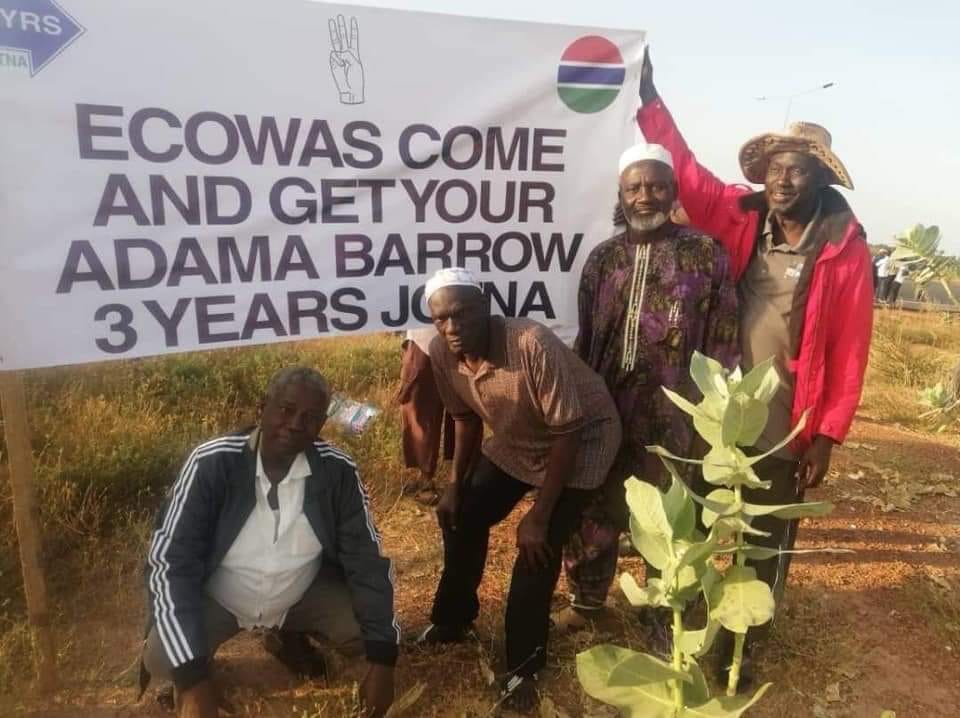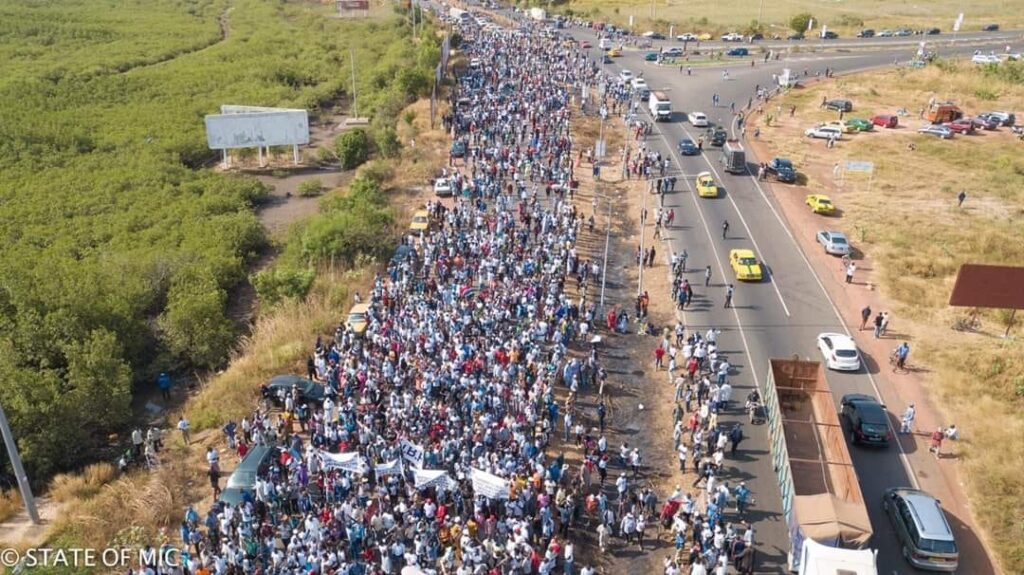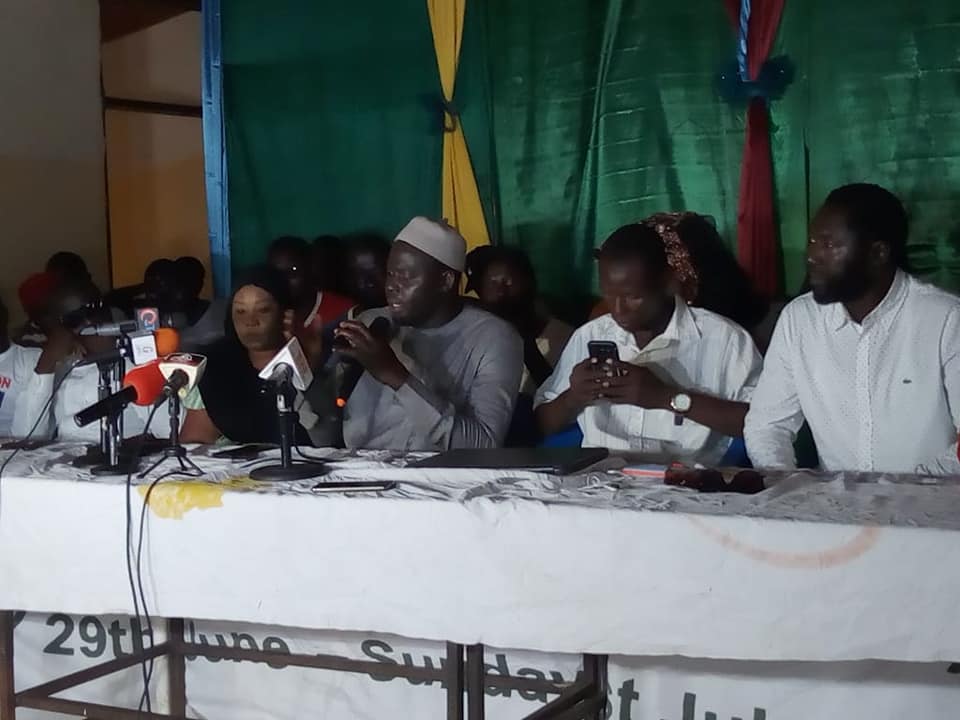
Today a brand “The 3 years JotNa Citizen Movement” has been created. A platform has also been built for them. Global media is talking about them and quoting them. Besides, Jeune Afrique and Al Jazeera News are a leading media group and biggest-selling magazine, they made headlines around the world. It is the exception which makes the headline.
More politics of melodrama will make the headlines. You keep wondering how the legal and law enforcement people could play into their hands. At best they would have ended up like (Mbaroadi who has said and declared worse than whatever “The 3 Years Jotna” did) if they ignored him. Plenty of hot air but no impact.
Sadly, the same citizen group of people who always overreact did in this matter and chased after a gnat with a sledgehammer. We all watched in utter shock, horror, and unbelief as the government in a series of forced and unforced errors and misadventures turned a small local matter into an international one. They win all prizes for clumsiness.
Let’s not talk about communication from the government. Such naivety.
The Gambia government made a mountain out of a molehill. “The 3 years Jotna” should have been left alone to test their organising powers, after all, their right to protest is guaranteed by the Constitution.
The semantic and rhetorical use of “The 3 years Jotna” is insufficient to affect clinical paranoia, and this portrays the government as daft. “The 3 years Jotna” has been unable to graduate from “aluta activism” to become a pragmatist and veritable organiser. “The 3 years Jotna” lacked a clear theme, strategy, and a discernible audience. Vladimir Illich Lenin described this sort of post-adolescence prancing around as infantilism.
Who are the strategists of the Gambia Police Force? Lt. General Frank Kitson in Low-Intensity Operations offers an illustration of how the British intelligence deliberately built up the most conservative of the nationalists, former British colonies, to marginalise the more radical wing. That is strategic savvy. There are many ways of disrupting unwanted protests for a government not lacking in thought. No thinking government does what this government routinely does. “The 3 years Jotna” mistake is that their protest, like its political campaign, is too parlous, disorganized and ill-thought-out for the situation we are in.

In my opinion, the government could have handled this matter better. Let me say why, and I think quite a few people agree: Who are “The 3 years Jotna”? Or more like who were “The 3 years Jotna members?” A straggling “Citizen Movement” who made more noise than impact and still imagines they are pro-democracy activist group doing Aluta all over the place.
Known generally as a rabble-rouser who likes to be in the news so that the international media can always report them and their political activities. There are rumors of unsavoury practices, but I hate rumours.
An efulefu. And the entire matter proved one thing: Power without strategy and control will never work. This government in many areas needs strategists. Raw power isn’t enough; brainpower works better. The government of President Barrow has created a brand out of a product. All the government needed to do was to ignore “The 3 years Jotna” calling for a revolution. They would have burned out. They don’t have the following, the doctrinal message, the impact, the capacity to rouse anyone to a revolution. They don’t appear to have the intellect either.
All the government needed to do was sit down and wonder how “The 3 years Jotna” would cause a revolution in the Gambia. How? If they were that popular, they would have attracted more followers. Heck, they brought in a miserly. Now how could this kind of politician cause a revolution if our government people were thinking strategically?

With the connivance of masquerades, suspected political entities and political operatives. “The 3 years Jotna” devised a plan to become popular by urging a “revolution” against President Adama Barrow to relinquish power after serving three years of the Coalition transition MoU agreement instead of the five years constitutional mandate.
What precipitated call for “The 3 years Jotna” call for Adama Barrow to honour the three years Coalition agreement pushing President Barrow to relinquish power by all means necessary? My guess. The rest of it we know.
The Gambia is in dire need of lessons in civics, and the understanding of the responsibilities of leaders and followers. The leaders and the governed in the Gambia must understand and appreciate the imperative of a culture of protest, strategy, mobilisation, as ways of deconstructing the political, social and economic bases of the country.
The failure to understand and appreciate the culture of protest can be traced to the hurried transition to civil rule (semi-democracy? The Economist churlishly described it), which came with debilitating side effects. Chief amongst these is a Constitution that does not reflect the federalist ethos upon which Independence was negotiated, while special-purpose electoral vehicles, sarcastically referred to as political parties, were hurriedly put together.
The key role of the civil society and its place in a democracy was a glaring omission. Concerning unfolding events, this now has to be addressed. Democracy needs a culture of protest within a constitutional framework, as we can glean from France – an established democracy raucously contending with the hyperactive Yellow Vests movement. The Gambia, with the weak interpretation of an ill-defined civil society, needs it more.
With rising poverty levels and glaring social and economic inequalities, protest is imperative. This is even more so since a presumed bastion of the civil society – the trade unions – have, in the local patois, effectively decamped to political society. The trade unions can no longer play the much-needed role of a vanguard, having become, in effect, “Aristocracies of Labour”, as Marx derided the trades unions of his day.
With this vacuum, there is the compelling need for civil society to have a popular front to induce and institutionalise a culture of protest to fight for social and economic rights, to extend the frontiers of democracy and be at the forefront of the resolution of the national question and the issues of the nationalities.
The use of the term ‘popular front’, associated with civil societies in Europe in the 1930s, is deliberate. Any culture of protest in the Gambia must accommodate and be sensitive to the pull of ethnicity and contrived religious differences.
As with the December 16 protests, the present ill-thought-through Revolution Now is already feeling the effect of this diversionary pull, a veritable weapon in the armory of the forces of retrogression and defenders of the status quo.
New forms of organisation, agitation, and propaganda must be developed, and luckily there is social media as a propelling tool. I make bold to say that to checkmate centrifugal and obscurantist forces, the culture of protest must be trajected on taking up single issues that highlight the failure of the State to be of benefit to the majority, as opposed to pandering to the interests of a pampered elite.
Such issues should include the prompt payment of pensions, corruption and end to impunity and the need to make them inflation-adjusted, universal health insurance coverage, free and compulsory education up to the age of 16 to counteract child labor and act as a brake on population explosion, etc.
By building a culture of protest around single issues, civil society will begin to see its hidden strengths, while new pan-Gambian forms of alliances and organisations will be organically induced.
A culture of protest is vital in the years ahead. The present state appears to be exhausting the limits of its possibilities. Only a culture of protests weaved around civil society, inducing new forms of national organizations, can prevent a void into which anarchy and, or fascism, can step. Developing a culture of protests is now fundamental to the defense of democracy and to act as a brake to the threat of disorderly national disintegration.
By Alagi Yorro Jallow











Recent Comments